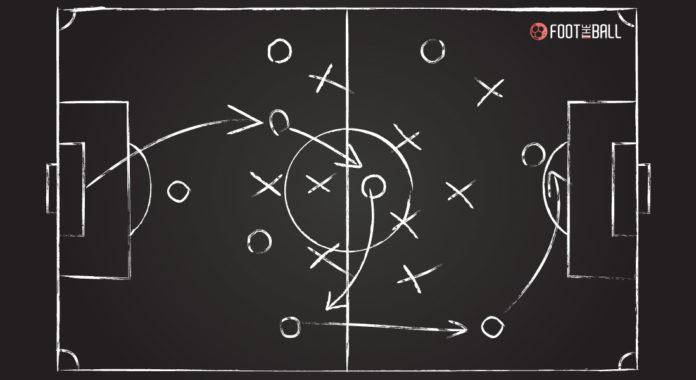With so much at stake in one of the world’s top domestic leagues, managers and their assistants work tirelessly to devise tactics and plans to give them an advantage. One of the reasons it’s called “the beautiful game” is because there are dozens of ways to win.
Some involve pure skill and tenacity, some teams win with sheer will, determination and organisation, and others focus their attack on one key player who can turn the game on its head with a single moment of brilliance.
Looking at the top Premier League managers is only the starting point when discussing the evolution of tactics. Some managers like Arsène Wenger and Sir Alex Ferguson changed their tactics over time to create different sets of successful squads. Conversely, some managers such as José Mourinho and Pep Guardiola imported their successful styles from overseas and had an immediate impact in England.
The formative years
English football in the 1980s was a tempestuous affair – for many older fans and purists, this was the best version of the game. No players were diving, few were on mega money and the hard-tackling yet skilful teams of the 1980s varied in quality, but all had their moments.
Although teams like Everton and Liverpool dominated mostly throughout this period, the Premier League ushered in the beginning of a new era when more money came into the sport, and deeper levels of analysis and punditry came into focus.
Expert opinion and analysis became a focal point for many, and this accelerated the evolution of the game. Managers such as Sir Alex pioneered a new era of psychology to ensure his team had a winner’s mentality. While there was still a lot of the ruggedness of the 1980s, more players from overseas on more considerable money and with greater flair came into the league, and this caused a shift in tactics as the 1990s progressed.
Manchester United
We could write an entire article on the evolution of Manchester United and Sir Alex Ferguson’s tactics throughout this period. Since they have won more Premier Leagues than any other club, exploring the legendary Scotsman’s tactics seems like the most appropriate place to begin. One of the critical things that Ferguson always maintained was that he needed to have a mentally strong set of leaders in the dressing room.
It started with England talisman and United legend Bryan Robson in the early 1990s, before focusing on the unbreakable, serial winner Roy Keane as the decade progressed. Throughout this period, Ferguson would often opt for a classic 4-4-2 setup, ensuring he filled the base of the squad with ball-playing talent who excelled in their position.
Roy Keane acted as a solid bedrock for this philosophy, as did players like Rio Ferdinand at a later date. Still, with players like Eric Cantona spearheading the forward play, he ensured the team had that extra 10%, because their engine was so robust.
How Ferguson changed through time
One thing that Ferguson has over any other Premier League manager is that he changed his tactics to win the league on multiple occasions. This is something that other great managers failed to do. His evolution, which spanned over three decades, was undisputed regarding quality and vision.
The treble-winning side of 1998/99 was the natural endgame for a team that had been so well-drilled and fine-tuned for the best part of a decade. However, Arsenal was hot on their heels.
They developed a style and brand of quick, attacking football that developed wing play and more aggressive forward link-up play than Ferguson ever implemented at the Red Devils. Ultimately, this evolution of tactics left Ferguson a distant second in the early part of the 2000s.
He needed to adapt and identify two players with whom he could build a fresh dynasty for a new era. By borrowing the tenacity and skill that Arsenal implemented so effectively, he brought in two of the most extraordinary talents of their generation to propel United back into the upper echelons of Europe – Cristiano Ronaldo and Wayne Rooney.
Rooney brought an explosive, brute strength and a work ethic on the pitch that could paralyse opposing teams with fear. Cristiano’s unique blend of skill, speed, shot power and will to win formed the backbone of a new team that developed Wenger’s style and completely surpassed it. This team would dominate the latter part of the 2000s and culminate in a UEFA Champions League win in 2008.
How The Special One changed the Premier League
Ferguson adapted to the fast-paced tactical evolution and ultimately came out on top. However, one of the reasons it developed so quickly was the charismatic, iconic Portuguese coach José Mourinho, who came into the Chelsea setup in 2004/05 and ran off with the Premier League title.
Although the 4-4-2 is a tried and tested method, Mourinho introduced a new brand of 4-3-3 tactics that focused on giving individual players more responsibility. John Terry and Frank Lampard acted as the core of the Chelsea team throughout this prosperous period. Didier Drogba was the incredibly gifted powerhouse upfront who would bully defenders and fire Chelsea to victory with his eye for goal.
Tactics can go a long way but the team needs that extra special ingredient or ingredients. For Chelsea, it was Frank Lampard and John Terry.
For Manchester United, it was Wayne Rooney, Roy Keane and Rio Ferdinand, while for clubs that play a more intricate style of attacking football, such as Manchester City, their talisman is all-round midfielder Kevin De Bruyne, who won back-to-back Player of the Season awards during City’s recent electric Premier League winning campaigns.
The modern era
Pep Guardiola was the only thing that stood between Manchester United and total European domination. His incredibly gifted Barcelona squad of the late 2000s and early 2010s is considered one of the most excellent domestic club sides ever. Lionel Messi, the greatest player ever, led the charge as Barcelona won multiple UEFA Champions League – twice besting Manchester United in the final.
He then imported his innovative and attacking version of tiki-taka football. Although Pep is sometimes credited with inventing this style, Johann Cruyff pioneered this version of close range, short, fast passing, maintaining possession and passing out from the back.
This game’s evolution was considerably different from the harsh, technical game of the 1990s. Players more suited to the mould of lean, agile, sharp-thinking midfielders started to take centre stage. Liverpool was the only team that could compete at this time, and this was through another style and set of tactics imported from Europe.
Guardiola vs Klopp
Charismatic German manager Jurgen Klopp transformed the fortunes of Liverpool FC, bringing them their first Premier League title and a sixth UEFA Champions League. This trophy had evaded Pep at City, despite his domestic dominance. Gegenpressing is the antidote to tiki-taka football when appropriately executed – it involves pressing high up the pitch and looking to immediately win the ball back by swarming the opposition.
Liverpool dominated the 2019/20 campaign and won the league by the most significant margin since City did in 2018. However, given their primary challengers were Manchester City and Guardiola’s style, which has won him European and domestic honours in every country he has managed, Liverpool’s dominance was more impressive. The rivalry between the two over the last few years has been incredible.
Arsenal has set up a new football brand involving an even deeper tactical approach. Borrowing pieces from Pep’s and Jurgen’s arsenals, Mikel Arteta has propelled the Gunners ahead of all of their domestic rivals, providing yet another blueprint for how to win this fascinating league.




